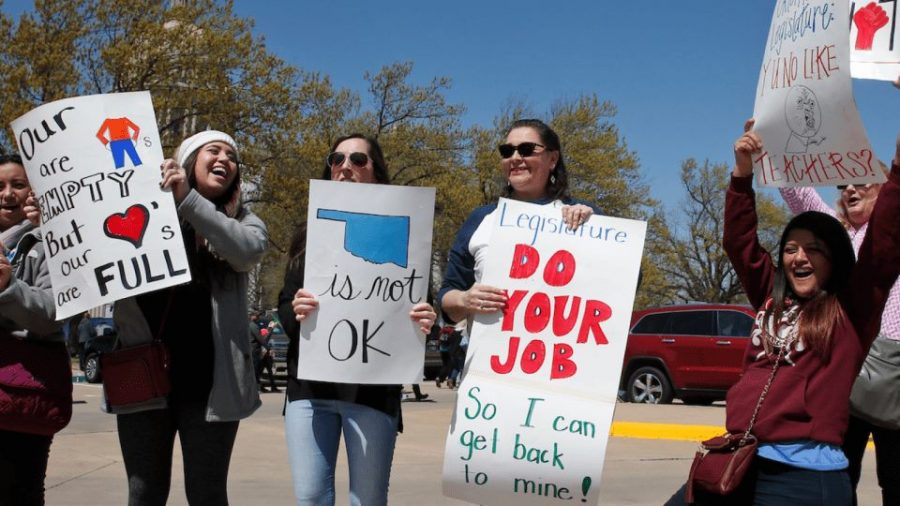Why Teachers are Striking and How Indiana Teachers Compare
April 12, 2018
Jeff Bezos, Peyton Manning, and your next door neighbor may not have done the same thing in their lives, but they are all similar in one particular way. Bezos, Manning, and your neighbor presumably live vastly different lives from one another; one is the richest man in America, one is a famous football player, and the other is someone who bought their house right next to yours. However, all three of these people have one thing in common: they all grew up going to school everyday with teachers who welcomed them with a smile and open arms. Teachers can accomplish many things with their students all the way from educating to just being a support system. There’s just one problem. What do we do when are teachers are the ones who need support?
Teachers across the United States are standing up for education and their personal finances that are being taken from them, for political gains. In Oklahoma, the protesting started on Monday, April 2nd with a combination of teachers and other state employees taking to the streets and the Capital Building in Oklahoma City.
Just over 200 different school districts had to close down on April 2nd and 3rd from too many teachers walking out; these teachers have not seen a raise or more money going to education in over a decade. Over the years, legislators in power have made continuous cuts from Oklahoma’s education to the point where 20% of all schools only go four days a week because they cannot afford to keep the lights on. Many teachers work more than one job.
Oklahoma is not the only state demanding change for schools across the nation. Kentucky teachers have been calling in sick to where enough are calling in to the point schools are having to shut down because they do not have enough substitutes. The majority of schools returned to class on Tuesday, April 3rd after just two days of protesting the new bill being imposed by Kentucky legislators. Some teachers started their spring break just as the protest began and were expected back in the classrooms on Monday, April 9.

Recently, Republican leaders have been working on Senate Bill 1 which dealt with changing teachers pensions, but after a classic switch in bills, SB1 became Senate Bill 151. SB151 was a bill concerning the sewage system in Kentucky but at the last second was replaced by the teacher pension act and turned into a 300 page document. After the votes came in Andy Beshear, the Kentucky Attorney General, publicly announced he is planning to file a lawsuit saying the bill contradicts the contract for state workers as he doubted many even read the document.
Beshear posted on Twitter saying, “Moments ago, Republican leadership amended a sewage bill to include “pension reform.” They are now forcing lawmakers to vote on the bill without time to read its 291 pages, with no testimony from the public and without any actuarial analysis. This is government at its worst.”
Bill 151 was passed by the senate and headed for Kentucky Governor Matt Bevin’s desk and deals with pension reform for teachers and other state employees. Current teachers and the ones that have already retired will be affected the least, but for the future teachers of Kentucky, the same cannot be said. They will no longer have a traditional 401K that will be invested into the stock market but more of a hybrid model. Also Bill 151 makes a change to the amount of sick days you can turn into cash for your retirement.

Before the bill was passed, state employees could carry over as many sick days as they pleased every year and when it came time for retirement you got paid extra for every single day you had. With the new bill, there is only a set number of days state employees can obtain and carry over into retirement. Many teachers and state employees across Kentucky were counting on getting paid for every single day that they had not used, with many needing that money to pay off their bills and keep food on the table. *Governor Bevin had until Tuesday, April 10, 2018 to veto the bill, but this action is very unlikely since he tweeted out right after the vote congratulating the 71 Republican members of Kentucky’s Senate and House of no longer pushing the pension problems further down the road. *Update – Bevin did not veto.
In Indiana and Kentucky it is illegal for teachers to go on strike, but in this particular situation the teachers in Kentucky just called in sick. So many teachers called in that the schools had to shut down because of not having enough substitute teachers.
Many teachers in Kentucky will see a significant decrease in the amount of money that is going to their retirement starting on January 1, 2019. On this date the state will start contributing 1.97% instead of 2.75% of teachers’ and other state employees’ salaries into their retirement funds.
In Indiana, teachers mostly bargain for everything, including the percent that the state puts into the teachers retirement funds. For the majority of teachers, the state contributes three percent of their salary to the retirement funds of teachers and other state employees. Currently, Indiana staff sick days do not roll over into their retirement, but that is negotiable for all staff.
In Kentucky, Senate Bill 151 is raising the age in which teachers can retire in Kentucky. SB 151 is implementing the “rule of 87.” The number 87 refers to the combined age of teachers or state employees plus the amount of years of participating in their field. The total must equal 87 years or more in order to be eligible for retirement. Previously, Kentucky teachers could retire after 27 years of service.
The state of Indiana has different age requirements for teachers across the state. The number of required years is either the rule of 85 or rule of 87 depending on the school corporation that the teachers belong to.
According to the IndyStar, compared to Kentucky, the average Indiana teacher salary is nearly $2,000 less, they have nearly one half of a student more per teacher, and receive $4,000 less per student.
This is a significant decrease in teachers’ pension for state employees across the these states and could affect the country later as more states’ teachers ponder striking. With all of these changes to the salaries of teachers, it may affect future people who are considering education as a profession. With a nationwide teacher shortage already in affect, altering teacher pensions could exacerbate the problem.














